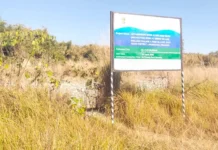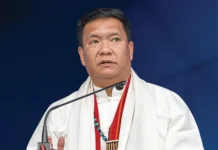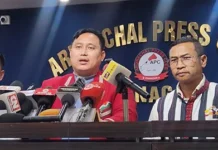TEZU, 10 Mar: More than 200 students, faculty members and research scholars of the Indira Gandhi Government College (IGGC) here and from other colleges of the state participated in a ‘national conference’ on the theme ‘Celebrate unity, embrace diversity: A tribute to the unsung heroes of Arunachal Pradesh’, organised by the history department of the IGGC here in Lohit district on Friday.
During the programme, IGGC Principal Dr Kangki Megu highlighted “the importance of celebrating the Azadi Ka Amrit Mahotsav to honour the sacrifices made in the freedom struggle by the sons and daughters from every nook and corner of the country.”
“As far as Arunachal Pradesh is concerned, there were many unsung heroes like Mutmur Jamoh, Moji Riba, T Dele, etc, who sacrificed their valuable lives to bring freedom to the motherland,” he said.
Doimukh (Papum Pare)-based Rajiv Gandhi University’s (RGU) History Professor Ashan Riddi said that “so many unsung heroes of the Indian freedom struggle sacrificed their lives fighting against British colonialism. But sadly, their contributions had not been recorded in any textbook or historical documents.
“However, with the initiative of the union culture ministry to mark the 75th year of independence, and to commemorate the unsung heroes of different states, several programmes of research have been undertaken by respective state governments,” he said, and informed that “the state government has entrusted RGU’s history department with the task of identifying and documentation of the same for educational and research purposes.”
Retired history professor SK Singh said that “micro-level studies are needed to know the details of the struggles made and the wars fought by the locals.”
“The history of the land needs to be documented and taught to the students from schools to the universities,” he added.
Prof Amarendra Kumar Thakur from the NEHU (Meghalaya) in his address said that “unity sustained is more important than unity celebrated.”
“Cultural plurality and cultural diversity need to be inculcated among all the people of a land through history,” he said. He traced the Indian history since independence and spoke about “how history was written and rewritten so far till the celebration of the Azadi Ka Amrit Mahostav.”
Dambuk (Lower Dibang Valley)-based BPYC secretary Abu Saring dwelt on the history of the unsung heroes of Arunachal, with specific reference to the Anglo-Adi Abor war fought from 1858-1912. He made a threadbare presentation on “the wars fought and the consequences of the same in the post-colonial era in creation of the erstwhile NEFA and now the state of Arunachal Pradesh.”
Roing (LDV)-based JTMDC Assistant Professor Dr Razzekko Deley presented a brief on “the contributions of Ponge Dele and Taji Dele as unsung heroes of Mishmi Hills who fought against the British during the three Bebejiya Mishmi expeditions from 1899-1900 and from 1914-1918.”
He urged students and budding researchers to “ponder how the Indian government under Jawaharlal Nehru won the heart of our tribal people that could not be carried out by the British.”
Tezu Child Welfare Committee member Dr Dimso Manyu highlighted the Anglo-Mishmi war, “in the context of Mishmis living in areas of Walong, Rima and Hayuliang in Anjaw district.”
Speaking about unsung heroes like Kaisha Manyu, who stopped the British from entering into the Mishmi Hills, Dr Manyu motivated the students to “study the subject history and learn about the unsung heroes of our state.”
Independent research scholar Nepha Wangsu delivered a talk on “the Anglo-Tai Khampti war of 1839-1843, which was the first uprising war against the colonial powers in Northeast India, led by Khampti chief Chaupha Planglu.”
An exhibition displaying photos of archaeological monuments and unsung heroes of Arunachal was also held during the conference.



